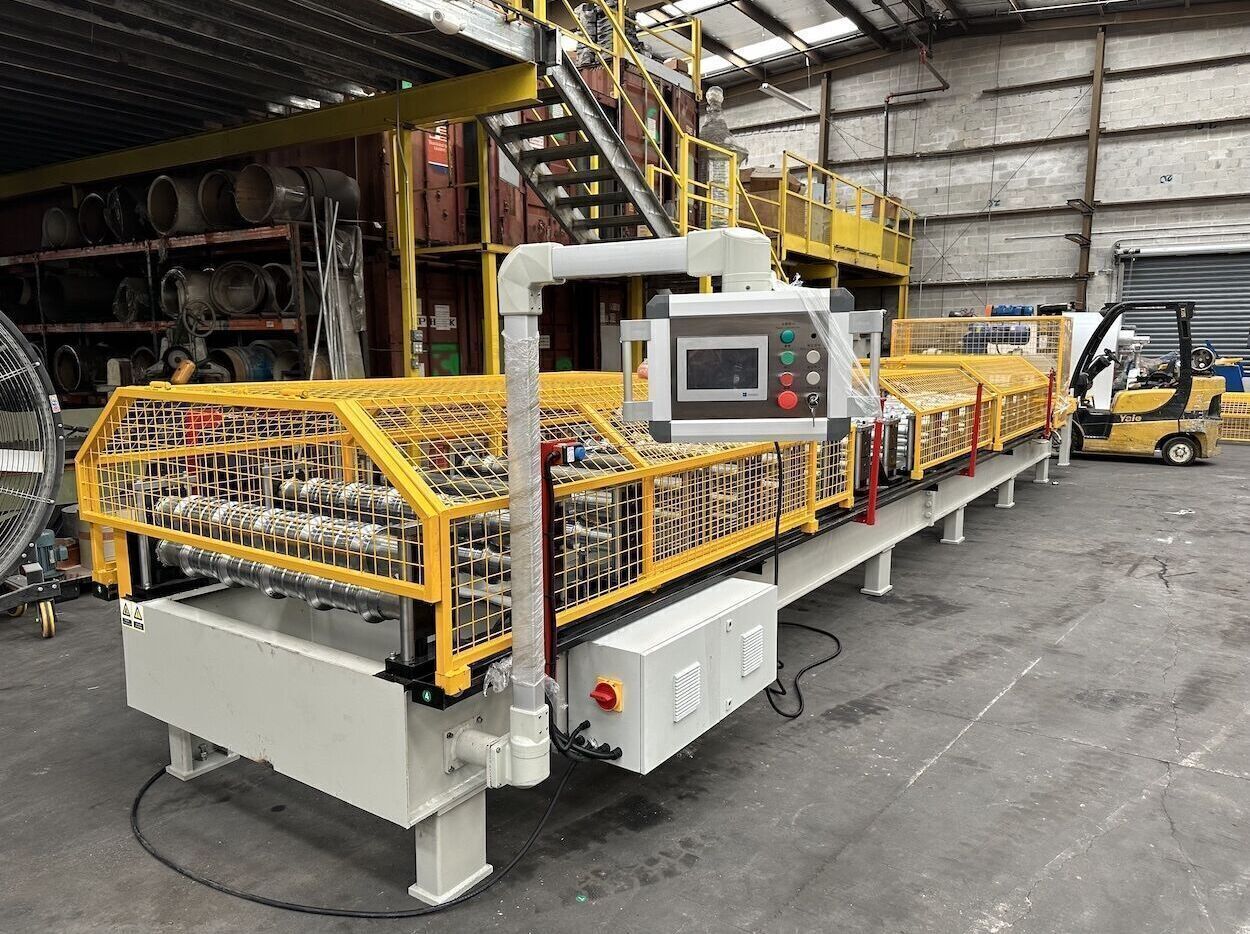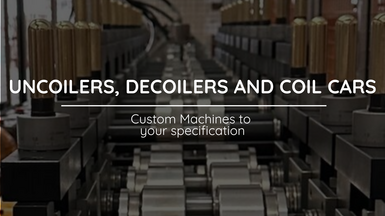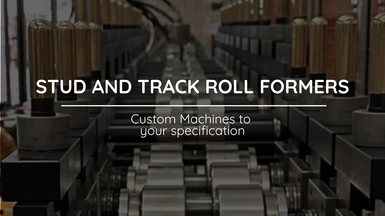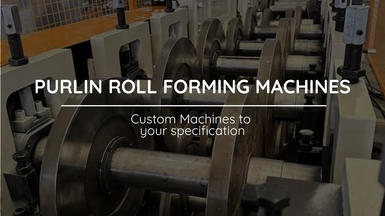
Commercial Metal Roof Panel Roll Forming Machine
Here's how a typical commercial metal roof panel roll forming machine works:
Posted on Monday, November 20, 2023
A commercial metal roof panel roll forming machine is a piece of equipment used in the construction industry to manufacture metal roof panels efficiently and with precision. These machines are also sometimes referred to as metal roofing roll formers or simply roll formers. They are commonly used in roofing and cladding projects for both residential and commercial buildings.
Here's how a typical commercial metal roof panel roll forming machine works:
- Material Loading: The process begins with loading a coil of metal sheet material onto the machine. Common materials used include galvanized steel, aluminum, or stainless steel.
- Uncoiling: The machine uncoils the metal coil as it feeds the material into the roll forming section.
- Roll Forming: The heart of the machine is the roll forming section, which consists of a series of rollers and dies. These rollers gradually shape the flat metal sheet into the desired profile for the roof panel. The number of rollers and their configuration depends on the specific profile or design of the roof panel being produced.
- Cutting: Some roll forming machines have integrated cutting mechanisms that can cut the formed metal panel to the desired length as it exits the machine. Others may have a separate cutting station downstream.
- Stacking or Packaging: Once the metal panels are formed and cut to the required length, they are typically stacked or packaged for transportation to the construction site.
Key features and considerations for a commercial metal roof panel roll forming machine include:
- Material Thickness and Width: The machine should be able to handle the specific thickness and width of the metal coil used for the roof panels.
- Profile Versatility: Some machines are designed to produce a variety of different roof panel profiles, while others are specialized for a specific profile.
- Speed and Efficiency: The production speed of the machine is an important factor, especially for large-scale commercial projects.
- Control System: Modern machines often come with computerized control systems that allow for precise adjustments and easy setup.
- Durability and Maintenance: It's essential to choose a machine that is built to last and requires minimal maintenance.
- Safety Features: Safety is a top priority when operating these machines. They should have safety guards and emergency stop mechanisms to protect operators.
- Customization: Depending on the specific requirements of the project, you may need customization options for your roll forming machine.
Commercial metal roof panel roll forming machines are valuable tools in the construction industry, as they can produce high-quality roof panels with efficiency and consistency. They help reduce labor costs and waste while ensuring that the panels meet the necessary specifications for the project. When considering the purchase of such a machine, it's important to work with reputable manufacturers or suppliers who can provide the right solution for your needs.
Commercial Metal Roof Panel Profiles
Commercial metal roof panel profiles refer to the different shapes, designs, and configurations of metal panels used for roofing in commercial and industrial buildings. These profiles not only provide aesthetic appeal but also serve functional purposes such as shedding water, improving structural strength, and enhancing energy efficiency. Here are some common commercial metal roof panel profiles:
- Standing Seam Roof Panels:
- Standing seam roof panels are one of the most popular choices for commercial and industrial buildings. They have raised seams that connect adjacent panels vertically.
- These profiles create a sleek, modern appearance and are known for their durability and weather resistance.
- Snap-lock and mechanically seamed are two common types of standing seam profiles.
- R-Panel or Ribbed Panels:
- R-panel or ribbed panels have a series of raised ribs or corrugations running horizontally across the panel.
- They are cost-effective, quick to install, and provide excellent structural support.
- These panels are often used in agricultural and industrial applications.
- Trapezoidal Roof Panels:
- Trapezoidal roof panels have a trapezoid-shaped profile with raised ribs that run parallel to the slope of the roof.
- They are known for their strength and water-shedding capabilities.
- These panels are commonly used in commercial and industrial roofing.
- Corrugated Roof Panels:
- Corrugated roof panels feature alternating ridges and valleys in a wave-like pattern.
- They are lightweight, cost-effective, and offer good water drainage.
- Corrugated panels are used in various applications, including agricultural and commercial buildings.
- Dutch Seam Roof Panels:
- Dutch seam roof panels are similar to standing seam panels but have a unique double-fold design that provides extra strength and weather resistance.
- They are often chosen for their classic appearance and longevity.
- Flat Lock Roof Panels:
- Flat lock roof panels are flat metal tiles that are interlocked with each other.
- They are known for their uniform appearance and are often used in architectural applications.
- Tapered Roof Panels:
- Tapered roof panels are designed to create a slope or pitch on a flat roof surface.
- They are used to improve water drainage and are commonly employed in commercial and industrial roofing projects.
- Snap-On Roof Panels:
- Snap-on roof panels have a simple, snap-together design that makes them easy to install.
- They are often chosen for their simplicity and cost-effectiveness.
- Curved or Radius Roof Panels:
- Curved or radius roof panels are custom-made to fit curved or arched roofs.
- They provide a unique and aesthetically pleasing look for commercial and architectural projects.
These are just a few examples of the many commercial metal roof panel profiles available in the market. The choice of profile depends on factors such as the building's design, climate, budget, and specific functional requirements. Each profile has its own advantages and is suited to different applications and architectural styles.
All our machines are all due to variations in the customer's demand, and we are always ready to assist with any issues. All machines are assembled by our expert team in Orlando, Florida. We have been leading the Roll Forming Machine market since 2009, and have great expertise, so you will be in safe hands. For further information, contact our team here.
For more Machines, browse our extensive range here
Roll Forming Machines LLC's New Factory
Posted on Sunday, March 23, 2025
We have relocated factories, which will be available for tours very soon.

Uncoiler, Decoiler and Coil Car Roll Forming Machine Accesories from Roll Forming Machines LLC
Posted on Sunday, November 24, 2024
Contact us today with your specifications for a custom Uncoiler, Decoiler or Coil Car at sales@rollformerusa.com or call us at (+1) (407) 859 1119

Stud and Track Roll Forming Machines from Roll Forming Machines LLC
Posted on Saturday, November 23, 2024
Contact us today with your specifications for a custom Stud and Track Machine at sales@rollformerusa.com or call us at (+1) (407) 859 1119

Cee and Zee Purlin Roll Forming Machines from Roll Forming Machines LLC
Posted on Saturday, November 23, 2024
Contact us today with your specifications for a custom Cee and Zee Purlin Machine at sales@rollformerusa.com or call us at (+1) (407) 859 1119